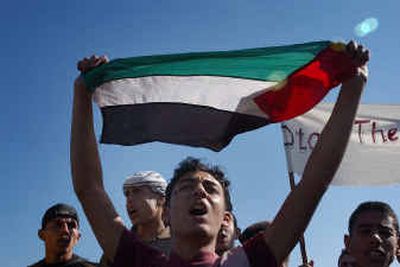Bush administration to help Palestinians conduct election

JERUSALEM – Seeing a rare and probably fleeting opportunity to influence the Israeli-Palestinian dispute, the Bush administration is preparing financial assistance to help Palestinians carry out elections in January to replace Yasser Arafat and will nudge Israel to help, too, U.S. Secretary of State Colin Powell said Sunday.
“I’ll be encouraging both sides to do everything they can to make sure that the elections come off and that the maximum number of Palestinians get the opportunity to participate,” Powell said of his planned meetings today with Israeli and Palestinian leaders.
Powell has not visited here since June 2003, reflecting the administration’s hands-off approach to Israeli-Palestinian problems. But the death of Arafat and the Jan. 9 election to pick his successor are seen as a chance to lay the groundwork for broader cooperation on steps toward permanent peace.
Powell, speaking to reporters during the flight here from Chile, where he had been attending the Asia Pacific Economic Cooperation forum, gave no details of what kind of and how much assistance the United States might provide. The issue is entangled in U.S. domestic politics with several powerful conservative Republicans opposing sending U.S. tax dollars to the Palestinian Authority.
“We are in consultation with people on (Capitol) Hill as to what might be possible or not,” Powell said.
The United States gives roughly $200 million in humanitarian aid each year through the United Nations. But the Bush administration’s decision to give another $20 million directly to the Palestinian Authority last year caused an outcry from some in Congress.
The United States is urging other nations to help as well. Donors are to meet in Oslo, Norway, in early December.
“We have some ideas, and we’re examining what resources might be available,” Powell said.
Powell will meet with Israeli Prime Minister Ariel Sharon and then travel to the Palestinian territories to meet with Palestinian Prime Minister Ahmed Qureia and his predecessor, Mahmoud Abbas.
The election faces potential threats from radical Palestinian groups that oppose negotiations with Israel.
The Israeli newspaper Haaretz reported Sunday that Israeli officials expect Powell to ask Israel to redeploy its troops from Palestinian cities, remove roadblocks and lift travel restrictions. Israel would comply, the report said.
Sharon’s government also has agreed to let Palestinians living in predominantly Arab East Jerusalem – which Israel claims as part of its capital – vote by mail, as happened during presidential elections in 1996.
Powell pointedly refused to divulge the U.S. position on calls for the release of Marwan Barghouti, a firebrand populist Palestinian leader who is in an Israeli prison on terrorist charges. Barghouti commands a large following on the West Bank and worked with Israelis before the outbreak of violence in September 2000.